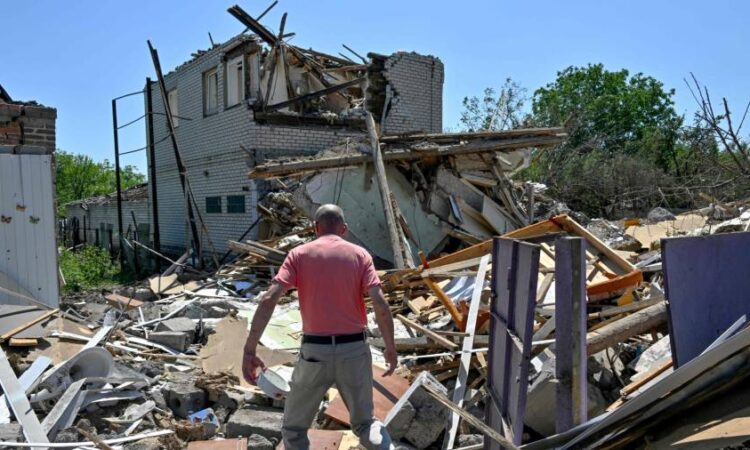
The head of the European Investment Bank has urged EU governments not to wait until the ink is dry on a Ukraine peace agreement before beginning the work of rebuilding its infrastructure.
In an interview with the Financial Times ahead of a conference in London dedicated to Ukraine’s recovery from war, Werner Hoyer said reconstruction needs to start now despite the “very, very bloody risky” nature of the work involved.
“The strengthening of resilience — call it reconstruction or whatever — needs to take place now and not one day, hopefully, when the ink on a peace treaty is dry,” Hoyer said, acknowledging that the war was likely to continue “for a long time”.
The EIB, which is wholly owned by EU member states, started lending to Ukraine in 2007 and has financed 54 projects worth over €8bn, some of which are ongoing.
The EIB’s role is to lend for infrastructure. It is far from the biggest lender to Ukraine. The World Bank has disbursed $23bn since February 2022, most of it in the form of budgetary support and much of it from the US. The IFC, the World Bank’s private lending arm, has committed a further $2bn.
Closer to home, the European Bank of Reconstruction and Development has lent €2.4bn since the beginning of the full-scale invasion and is also preparing for a capital increase to be able to ramp up lending to Ukraine.
Hoyer said there was a full pipeline of projects to be financed and there should be no drop in lending, with €2bn to €3bn of funds needed from the EIB this year. The total cost of reconstruction is estimated at hundreds of billions of euros.
The problem, Hoyer said, was that the EIB needed to raise finance in capital markets. Those markets would not lend without guarantees from EU member states that they would cover the losses for lending on projects in a war zone.
While there had been guarantees in the past, he said there were none now in the EU Budget for 2023. “We have a pipeline full of good projects and a limitation because of a lack of guarantees.”
However, others believe that the EIB could use its balance sheet to lend to the war-torn country, rather than relying on guarantees from EU member states.
Hoyer said he hoped they would resume next year with a new EU budget. In the meantime, the bank had set up a trust fund for voluntary contributions from EU member states.
He urged EU member states to make commitments to fill the trust fund at the conference in London. “We’re still not near where we want to be,” he said.
His words came as the European Commission prepared to unveil a review of its long-term budget that will include a four-year, €50bn funding package for Ukraine comprising both grants and loans. The financing, which will need the backing of the EU member states, aims to provide longer-term certainty beyond an €18bn EU budget support package for this year.
Hoyer said the EIB wanted to help fix bridges that Ukraine blew up in 2022 to stop the advance of Russian forces, as well as maintain infrastructure such as the metro systems in large cities, which have traditionally relied on Russian technology.
The task of rebuilding the Kakhovka dam and its hydro power station should begin “as soon as possible” once the area is sufficiently secure, he added. This would help meet Ukraine’s need for power, alongside water both for drinking and for irrigation.
BlackRock and JPMorgan Chase are helping Ukraine’s government draw up plans for a reconstruction bank to steer public seed capital into rebuilding projects, which Hoyer said could work in tandem with the EIB’s role in the country. Some estimates, such as those from the World Bank, have put the eventual reconstruction costs as high as $411bn.
He urged the private sector to accelerate its ambitions for an economy that he said was “doing surprisingly well” for a country under siege from a foreign power. Output of the Ukrainian economy fell 30 per cent in 2022, according to the IMF, but is expected almost to stabilise this year. The out-turn will depend on the course of the war and the potential return of refugees.
“From the quick repair of destroyed or damaged infrastructure all the way to generating tax revenues, I must say I am really impressed,” Hoyer said, adding that many EU citizens would be amazed by the efficiency of Ukraine’s bureaucracy.
But he stressed that he was “not naive” about corruption that still existed in Ukraine’s economy and that the EIB always ensured that it saw the results of its lending before disbursing additional amounts.
Additional reporting by Ben Hall in London and Sam Fleming in Brussels





